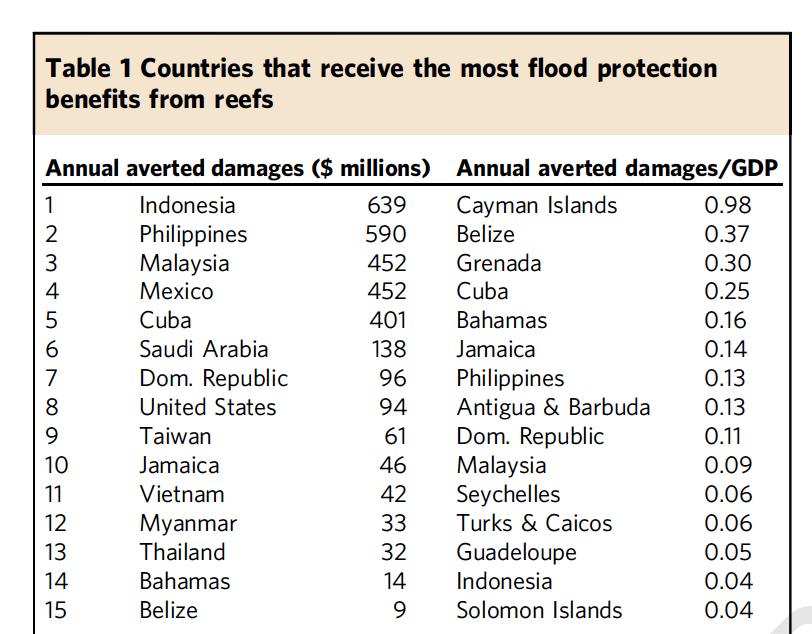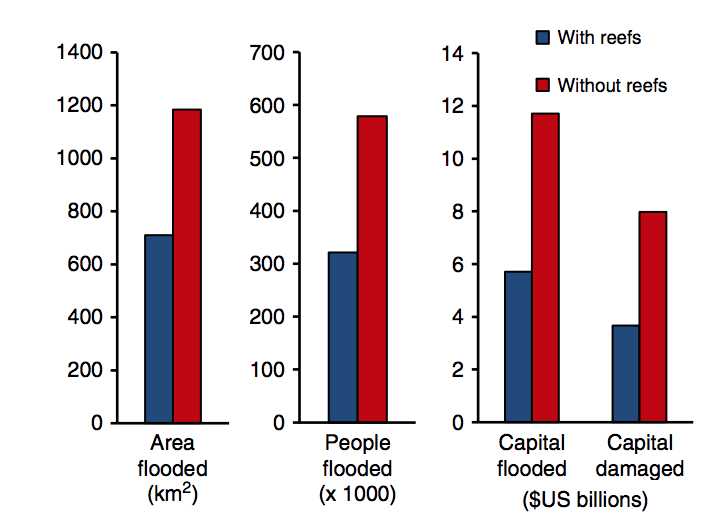Without Coral Reefs, Annual Global Damages from Flooding Would Double
A new paper in Nature Communications by Conservancy scientist Mike Beck and his colleagues at IHCantabria uses the tools of ecology and engineering to show for the first time – in economic terms, in dollars and cents – how much every coral reef nation’s economy gains in flood savings each year by conserving its reefs.
The big takeaway: The countries with the most to gain — in terms of risk reduction — from reef conservation and restoration of their coral reefs are Indonesia, the Philippines, Malaysia, Mexico, and Cuba, where annual expected flood savings exceed $400M for each nation. The U.S. also receives many benefits from coral reefs (ranking 8th globally), with almost $100M annually in direct flood reduction benefits.
It’s worth noting that coral reefs, which reduce wave energy, have always provided risk reduction benefits. The importance of this study is that it quantifies and translates that existing and intrinsic value clearly into the language of engineering, insurance and economics – the language of decision making for business, governments and people around the world.
Having these clear economic valuations shows why it can make cost-effective sense for countries to invest in national reef infrastructure to protect their people, property and economies now and far into the future.
The authors note that Indonesia, the Philippines, Malaysia, Mexico and Cuba will see the biggest total gains while many small island nations across the Caribbean will see the greatest per capita gains from preserving reefs, which are increasingly and urgently threatened by climate change.
The Global Flood Protection Savings Provided by Coral Reefs also shows the risk the world faces without its reefs. Without living coral reefs, the annual expected global damages from flooding would double – an increase of US $4 billion. The costs from frequent storms would triple. If coupled with sea level rise, flooding could quadruple. For the big 1-in-100-year storms, flood damages could increase by 91 percent to $US 272 billion.

Clearly, the risk reduction value of reefs alone is enough to provide material benefit to a country’s economy. In addition to helping alleviate costs related to flooding, coral reefs also offer other economic co-benefits like tourism and fisheries. With those benefits factored in, per capita, the study finds that reefs provide the most benefits to small island states including the Cayman Islands, Belize, Grenada, Cuba, Bahamas, Jamaica and the Philippines.
The study uses models commonly applied in the engineering and insurance sectors to quantify and value the flood reduction benefits provided by coral reefs world wide – the first time a study of this magnitude has been conducted.
“We built the best global coastal flooding model and then we added reefs to estimate flood risk overall and the benefits provided by these habitats,” said Professor Íñigo Losada, from IHCantabria at the University of Cantabria. “This represents the first global application of a coastal protection model that probabilistically estimates risk and the benefits of coastal ecosystems.”

This study compares the flooding that occurs now with the flooding that would occur on coast lines with coral reefs if just the topmost 1 meter of living coral reef were lost; losses that are already happening globally.
“Unfortunately, we are already losing the height and complexity of shallow reefs around the world, so we are likely already seeing increases in flood damages along many tropical coastlines,” said Beck, Lead Marine Scientist for The Nature Conservancy and Research Professor at UC Santa Cruz. “Our national economies are normally only valued by how much we take from nature. For the first time, we can now value what every national economy gains in flood savings by conserving its coral reefs every year.”
National economies are normally only valued by how much we take from nature. For the first time, we can now value what every national economy gains in flood savings by leaving its coral reefs in place and conserving them.
In a similar way, the quantifiable flood savings from coral reefs can be directly used by governments, for example, in disaster recovery planning, and by businesses such as insurance. The risk of flooding is already clear and coastal development and climate change are only increasing the risk of flooding for communities across the globe.
“These estimates make a compelling case for present-day spending on reef management without assuming that reefs will disappear altogether under a business as usual scenario – nor do they rely on just rare, large storms. Better valuations of the benefits provided by coastal habitats like coral reefs, provided in terms familiar to decision makers, can help decision makers recognize the value and ensure the protection of these critical habitats and their services,” said Dr. Borja Reguero, a Research Scientist at UC Santa Cruz.
This work provides a clear case for why we must manage reefs better, and the Conservancy has already begun working with disaster agencies and the insurance industry, including FEMA, the World Bank, Munich Re, Swiss Re, and Lloyd’s, to use these results to inform funding decisions and insurance tools that can support reef restoration for risk reduction.
(The results from these analyses are mappable and downloadable on the Natural Coastal Protection app at http://maps.oceanwealth.org/)
“Coral reefs are living ecosystems that can recover if they are well-managed, and this study identifies why and where we should find the needed support for restoration and management,” said Beck. “It is our hope that this science will lead to action and greater stewardship of reefs — for all of their values, economic, social and environmental — around the world.”




Join the Discussion